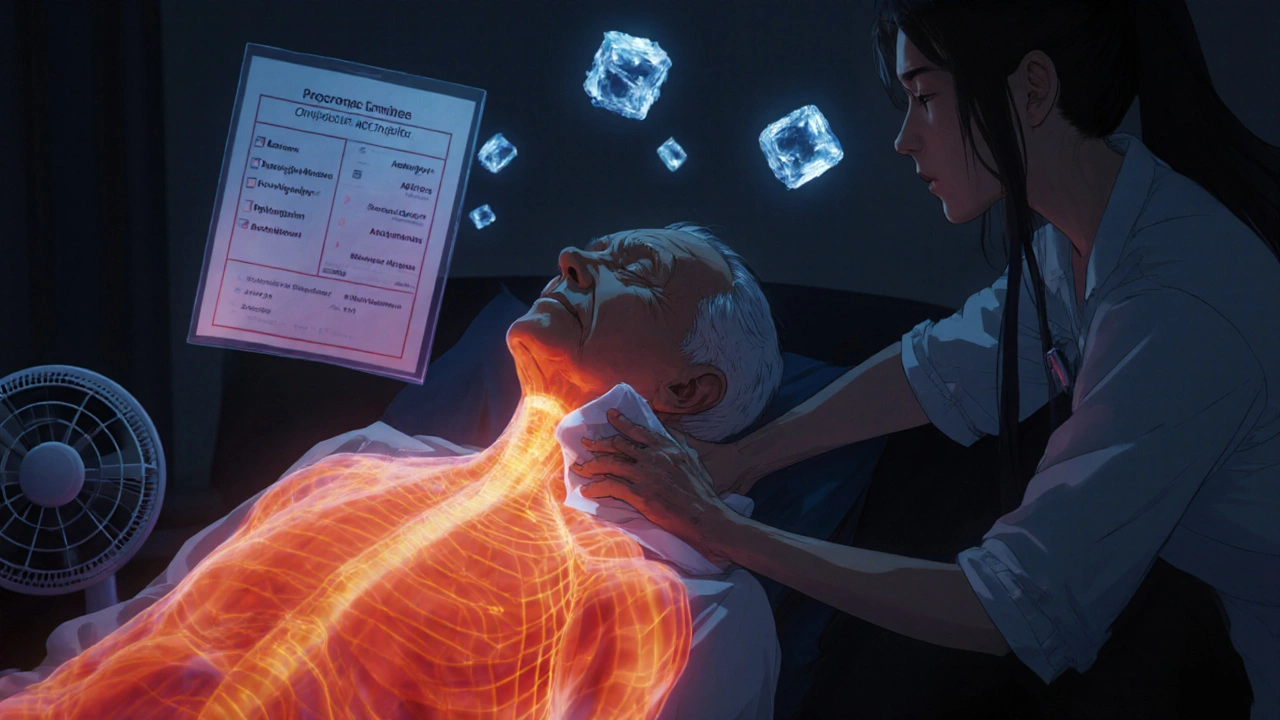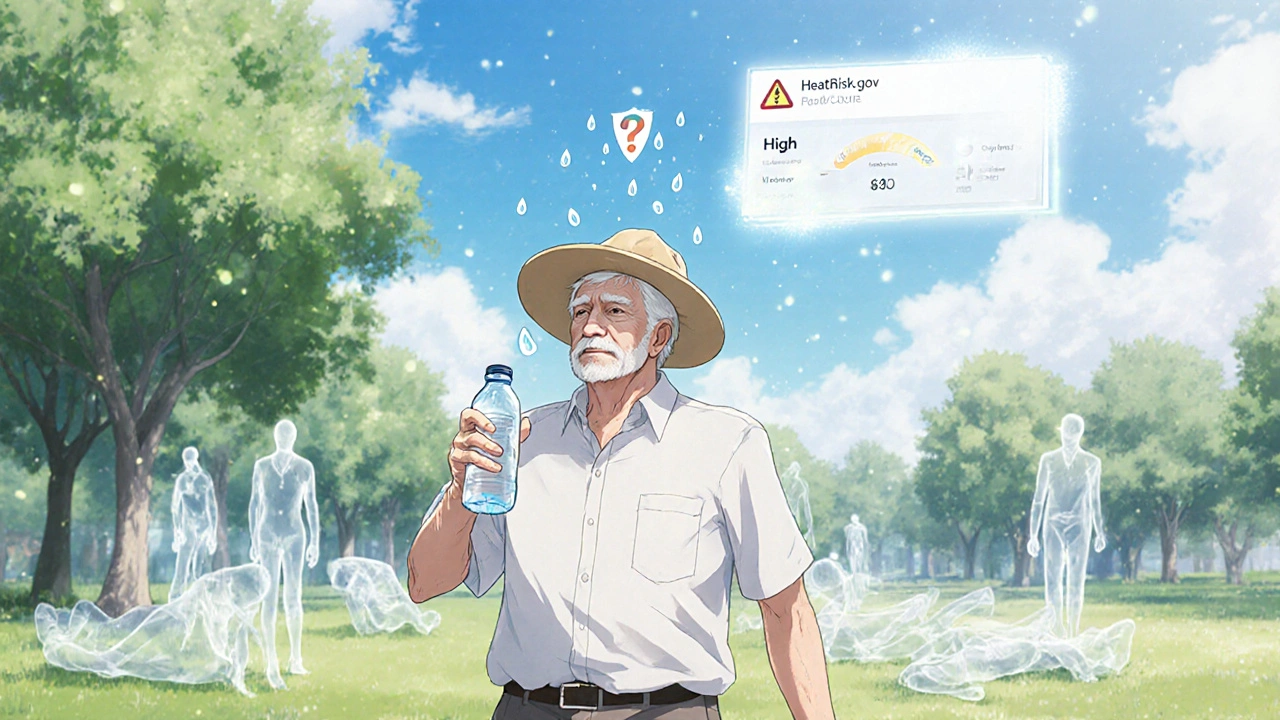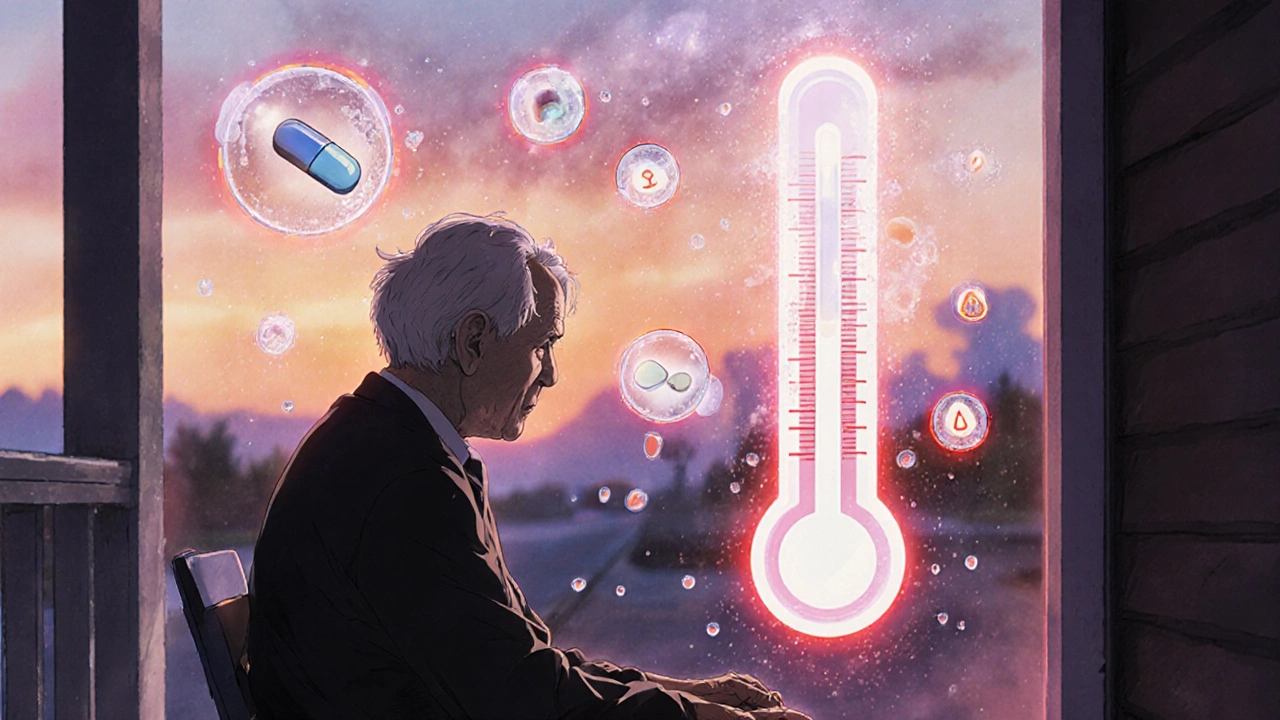Why Heat Turns Ordinary Medications Into Hidden Dangers for Seniors
It’s not just the heat that’s dangerous for older adults-it’s what the heat does to their medications. Many common prescriptions that seniors take every day can turn into silent threats when temperatures rise. A person on a diuretic for high blood pressure might not feel thirsty, even as their body loses water. Someone taking an antipsychotic for dementia could be overheating without realizing it because their brain can’t signal the body to cool down. These aren’t rare cases. In fact, more than 87% of seniors over 65 take two or more prescription drugs, and nearly half of them are on medications that interfere with how the body handles heat.
The problem isn’t just discomfort. Heat-related illness kills more than 600 Americans each year, and seniors make up the majority. During heat waves, emergency rooms see spikes in cases of heat exhaustion and heat stroke-many of which are directly linked to medication use. The CDC reports that between 2004 and 2018, heat-related deaths rose by 67%. And with climate change bringing longer, hotter summers, this isn’t a seasonal issue anymore. It’s a year-round risk that demands action.
Medications That Make Heat Deadly
Not all medications are risky in the heat, but some are especially dangerous. Here’s what to watch for:
- Diuretics (like hydrochlorothiazide and furosemide): These are called "water pills" because they help the body get rid of extra fluid. But they also reduce thirst by 30-40%, so seniors may not drink enough water-even when they’re sweating. This leads to dehydration and low sodium levels, which can cause confusion, falls, and even seizures.
- ACE inhibitors and ARBs (like benazepril, losartan): These blood pressure drugs lower the body’s natural urge to drink. Studies show they reduce thirst by about 25%. When combined with diuretics, the risk doubles. Blood volume drops, kidneys struggle, and electrolytes become unbalanced.
- Antipsychotics (like quetiapine, clozapine): Used for Alzheimer’s and other dementias, these drugs block the brain’s ability to regulate temperature. Research from the Mayo Clinic found they can raise core body temperature by 1.5-2.0°F without the person feeling hot. That’s enough to trigger heat stroke silently.
- Anticholinergics (like diphenhydramine in Benadryl or Tylenol PM): These are often used for sleep, allergies, or bladder control. But they shut down sweat glands by 35-50%. Without sweat, the body can’t cool off. In one study, seniors on these drugs were three times more likely to suffer heat illness than those not taking them.
- Sun-sensitive drugs: Some antibiotics (like doxycycline), antifungals, and even certain antidepressants make skin far more vulnerable to sunburn. The FDA says these drugs can increase sunburn risk by 400-600%. A mild sunburn can trigger inflammation, raise body temperature, and worsen dehydration.
It’s not just one drug-it’s the combo. Taking a diuretic with an ACE inhibitor? That’s a double hit. Add an anticholinergic for sleep? The risk jumps again. Many seniors don’t realize their medications are working against each other in the heat.
What to Do Before Summer Hits
Waiting until it’s hot is too late. Prevention starts with a medication review-ideally in late spring or early summer.
Ask your doctor or pharmacist: "Which of my meds make me more sensitive to heat?" Be specific. Bring a list of every pill, patch, and supplement-even over-the-counter ones. Many seniors don’t think of Benadryl or sleep aids as "medications," but they are.
Don’t assume your current dose is safe in hot weather. The CDC recommends reviewing medication timing and dosage during heat events. For example, if you take a diuretic in the morning, your body may be dehydrated by afternoon. Your doctor might suggest switching the time of day you take it-or even lowering the dose temporarily during heat waves.
Also, ask about fluid restrictions. Many seniors with heart failure are told to limit water to 1.5 liters a day. But during extreme heat, that can be deadly. The CDC says 43% of these patients develop dangerous electrolyte imbalances during heat waves. Ask: "Can I drink more water if it’s over 85°F?" A simple adjustment can save a life.

Hydration That Actually Works
Drinking water isn’t enough. You need the right kind of fluids, at the right time.
- Drink even when you’re not thirsty. Thirst fades with age. By the time you feel thirsty, you’re already dehydrated. Set a timer to sip water every hour, especially between 10 a.m. and 4 p.m. when it’s hottest.
- Choose electrolyte drinks wisely. If you’re on a diuretic, plain water won’t replace lost sodium. Look for drinks with 120-150 mg of sodium per 8 oz. Avoid sports drinks with too much sugar-they can make dehydration worse.
- Avoid caffeine and alcohol. Both act as diuretics. A cup of coffee or a glass of wine can increase urine output by 40-60%. That’s the opposite of what you need in hot weather.
- Keep water nearby. Place a water bottle on your nightstand, by the couch, and in the car. Use a marked bottle so you can track how much you’ve drunk.
For seniors who have trouble remembering to drink, caregivers can use a simple checklist: "Did you have 2 glasses of water by 10 a.m.? 2 more by 1 p.m.?" Small reminders make a big difference.
Staying Cool Without Air Conditioning
Not every senior has access to air conditioning. But you don’t need a full AC unit to stay safe.
- Keep indoor temps below 78°F (25.6°C). If you don’t have AC, use fans to move air. Place a bowl of ice in front of a fan to create a DIY air cooler.
- Close blinds and curtains during the day. Sunlight through windows can raise room temperature by 15-20°F. Dark curtains block heat better than light ones.
- Take cool showers or sponge baths. A quick 5-minute cool shower in the morning and evening can lower core body temperature. Wet a cloth and place it on your neck or wrists-those areas have major blood vessels close to the skin.
- Wear the right clothes. Light-colored, loose cotton clothing helps sweat evaporate and keeps you 5-7°F cooler than synthetic fabrics. Avoid dark colors and tight fits.
- Use sunscreen daily. Even on cloudy days. Apply SPF 15 or higher to all exposed skin. Reapply every two hours-or after sweating. If you’re on a sun-sensitive drug, wear a wide-brimmed hat and UV-blocking sunglasses too.
Public spaces like libraries, community centers, and malls are free air-conditioned refuges. Plan outings during cooler hours-early morning or after 7 p.m.

Signs of Trouble-Don’t Wait for Heat Stroke
Heat exhaustion often looks like the flu: headache, nausea, dizziness, muscle cramps, tiredness. But in seniors, symptoms can be subtle-or even missing.
The CDC warns that 41% of older adults don’t show classic signs. Instead, they may just seem confused, quiet, or off. That’s because medications can mask symptoms. A senior on an antipsychotic might not feel hot, but their body temperature could be climbing dangerously.
Watch for these red flags:
- Confusion or disorientation
- Sudden weakness or difficulty standing
- Dry skin (no sweating) with red, hot skin
- Rapid heartbeat or shallow breathing
- Body temperature above 103°F (39.4°C)
- Loss of consciousness
If you see any of these, act immediately. Move the person to a cool place. Give them cool water if they’re alert. Sponge them with cool water. Call 999 if there’s no improvement in 30 minutes-or if they’re confused, vomiting, or unconscious. Heat stroke is a medical emergency. Every minute counts.
How Caregivers Can Help
If you care for an older adult, your role is critical. You’re often the first to notice changes.
- Check in twice a day during heat waves: "How are you feeling? Are you thirsty? Have you taken your water?"
- Use a thermometer to check room temperature. If it’s above 80°F, take action.
- Know their meds. Keep a printed list with names, doses, and why they’re taken. Share it with doctors and emergency responders.
- Use the CDC’s Heat and Medication Risk Assessment Tool (HM-RAT) to input their medications and get a personalized risk score.
- Join programs like the American Geriatrics Society’s "I’m OK" check-in system. Regular calls or visits reduced hospitalizations by 33% in pilot programs.
One study showed caregivers who monitored for early cognitive changes-like forgetfulness or slurred speech-reduced heat stroke progression by 62%. You don’t need to be a nurse. You just need to pay attention.
The Future Is Here-And It’s Personalized
There’s new tech making prevention easier. The National Institute on Aging and EPA launched HeatRisk.gov, a free website that combines local weather forecasts with your medication list to give you a daily heat risk score. Over 1.2 million seniors used it in 2023.
Researchers are also testing a "heat resilience" supplement designed for seniors on multiple medications. Early results show it improves body temperature control by 28%. It’s not on the market yet, but it’s a sign that science is catching up to the problem.
Meanwhile, the CDC predicts extreme heat days will increase by 50% by 2050. That means what we do today-reviewing meds, staying hydrated, checking on neighbors-won’t just help this summer. It’ll protect lives for years to come.
Which medications are most dangerous in hot weather for seniors?
Diuretics (like hydrochlorothiazide), ACE inhibitors and ARBs (like benazepril or losartan), antipsychotics (like quetiapine), and anticholinergics (like diphenhydramine) are the most risky. These drugs reduce thirst, block sweating, or interfere with the brain’s ability to regulate temperature. Some antibiotics and antifungals also increase sun sensitivity. Always review your full list with a pharmacist or doctor before summer.
Should seniors drink more water during heat waves, even if they’re on fluid restrictions?
Yes-but only after talking to their doctor. Many seniors with heart failure are told to limit fluids to 1.5 liters a day. But during heat waves, that can lead to dangerous electrolyte imbalances. A doctor may temporarily adjust the limit, especially if the senior is on diuretics or has low sodium levels. Never change fluid intake without medical advice.
Can over-the-counter drugs like Benadryl cause heat problems?
Yes. Benadryl (diphenhydramine) is an anticholinergic that reduces sweating by 35-50%. That means the body can’t cool down naturally. Even one dose can increase heat illness risk. Many seniors take it for sleep or allergies without realizing the danger. Always ask a pharmacist if an OTC drug is safe in hot weather.
What should I do if a senior shows signs of heat exhaustion?
Move them to a cool, shaded place immediately. Give them cool water if they’re alert. Apply cool, wet cloths to their neck, wrists, or armpits. Fan them gently. If they don’t improve within 30 minutes-or if they’re confused, vomiting, or unconscious-call 999 right away. Heat exhaustion can turn into heat stroke quickly, especially in seniors on medications.
Is air conditioning necessary for seniors in hot weather?
Not always, but it’s the safest option. If you don’t have AC, use fans, close blinds during the day, take cool showers, and spend time in public places like libraries or malls. Keep indoor temps below 78°F (25.6°C). For seniors on high-risk medications, AC isn’t a luxury-it’s a medical necessity during extreme heat.

Ron and Gill Day
November 19, 2025 AT 05:10This article is such a basic, common-sense guide. Like, wow, who knew heat could mess with meds? Maybe if we stopped letting grandma take 12 pills a day this wouldn’t be an issue. Also, why is the CDC still using 2018 data? This is 2025. We need real-time tracking, not nostalgia.
Alyssa Torres
November 19, 2025 AT 21:12OMG I’m crying right now. My abuela takes hydrochlorothiazide AND Benadryl for sleep and she’s been so tired all summer. I had NO IDEA. I just thought she was getting older. I’m printing this out and taking it to her doctor tomorrow. Thank you for saving her life with this. 💔🫂💧
Summer Joy
November 21, 2025 AT 18:06Ugh. Another performative wellness article. You think people care? Most seniors are on Medicaid and live in apartments with no AC. The real problem? The system doesn’t care. But hey, let’s all sip electrolyte water and blame the meds. #FirstWorldProblems 🙄
Aruna Urban Planner
November 23, 2025 AT 15:38The pharmacokinetic interaction between anticholinergics and thermoregulatory pathways in geriatric populations is a well-documented phenomenon in gerontology literature. However, the structural inequities in access to hydration infrastructure and climate-resilient housing remain under-addressed in public health discourse. A systems-level intervention is required, not merely individual behavioral modification.
Also, the HM-RAT tool is underutilized. Its validation cohort was predominantly urban. Rural seniors may not have internet access to use it. This is a digital divide issue disguised as medical advice.
Nicole Ziegler
November 25, 2025 AT 07:13my grandma just got a new water bottle with a time tracker 😍 and she’s drinking now. also i got her a little fan for her nightstand. she says it’s "the best thing since the remote" 😊
Bharat Alasandi
November 26, 2025 AT 23:56in india we call this "heat poisoning" and grandmas always drink nimbu pani with salt. simple, cheap, works. why make it so complicated? also, why are we all talking about meds like they’re magic bullets? the real fix is shade, water, and rest. no app needed.
ps: my auntie takes 5 pills and still walks 3km daily. she’s 82. maybe we’re over-medicalizing aging?
Kristi Bennardo
November 27, 2025 AT 20:01This article is dangerously irresponsible. You suggest seniors increase fluid intake without medical supervision? That’s a recipe for hyponatremia, which can cause cerebral edema and death. You’re promoting reckless advice under the guise of "helping." Where’s the liability disclaimer? This should be taken down immediately.
Shiv Karan Singh
November 28, 2025 AT 04:15lol so diuretics are bad but you don’t mention that the real culprit is Big Pharma pushing these meds because they make more money? Also, why is the CDC not talking about how climate change is caused by fossil fuel companies? This whole thing is a distraction. Seniors are being sacrificed for profit. Wake up.
and btw, my neighbor takes 14 meds and he’s fine. so your "87%" stat is fake news.
Ravi boy
November 29, 2025 AT 20:58my uncle in delhi takes amlodipine and he drinks water from the tap and sits under a tree at noon and he’s fine. maybe its not the meds its just the usa being extra? also i think they should give free fans to old people. not more apps. just fans. 🤷♂️
Matthew Karrs
December 1, 2025 AT 04:14Let me guess - this is all part of the CDC’s agenda to push mandatory hydration tracking via smartwatches. Next thing you know, your meds will be synced to a government database that flags you as "heat-risk" and your social security gets adjusted. They’re already using weather data to predict who’s "likely to die" so they can cut benefits early. This isn’t advice. It’s surveillance.
Matthew Peters
December 3, 2025 AT 02:26I didn’t realize antipsychotics could stop your body from sensing heat. That’s wild. My dad’s on quetiapine and he used to complain about being "too warm" in the summer - I thought he was being dramatic. Now I get it. I’m scheduling a med review this week. This changed my perspective.
Also, the DIY fan with ice? Genius. I’m trying that tomorrow.
Liam Strachan
December 3, 2025 AT 23:16Really useful piece - thank you. I’m from the UK and we don’t have AC culture here, so this is super relevant. My mum’s on losartan and I’ve started leaving water by her armchair. Small things matter. Also, the point about not assuming thirst = hydration? Spot on. We all forget that.
Gerald Cheruiyot
December 5, 2025 AT 14:45Medications are just one part of a broken system. We treat aging like a disease to be managed with pills. But what about community? What about dignity? What about letting people live in shade, with quiet, with love? The real solution isn’t in a CDC pamphlet. It’s in showing up.
Also, I don’t use emojis. But I do sit with my mom when she’s hot. And I hold her hand. That’s the only supplement that matters.
Michael Fessler
December 6, 2025 AT 02:36As a geriatric pharmacist, I’ve seen this first hand. Diuretic + ACEi combo is the most dangerous - especially in summer. But here’s the thing: most seniors don’t know what their meds are called. They just take the little pills in the organizer. That’s why we need pill labels with heat risk icons. Like a traffic light: green = safe, yellow = monitor, red = call doc.
Also, Benadryl? It’s everywhere. Even in "natural sleep aids." People have no idea. We need pharmacy-led education - not just articles.
daniel lopez
December 6, 2025 AT 16:27Anyone else notice that this whole article avoids the truth? The real reason seniors are dying in heat waves is because they’re being abandoned by their families and forced into nursing homes that don’t have AC. And the government doesn’t care because they’re old. This isn’t about meds. It’s about ageism. Wake up. This is genocide by neglect. And you’re all just reading about electrolytes like it’s a lifestyle blog.